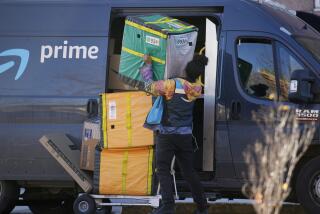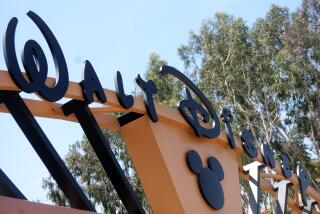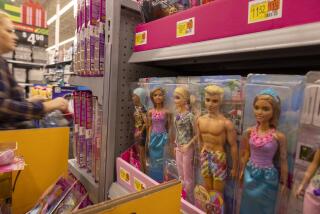Greenpeace stages protest at Mattel office over Barbie packaging
Environmentalists have launched a global campaign against Mattel Inc., the world’s largest toy company, as part of a decade-long effort to force multinational corporations to purge their operations of any links to rain forest destruction.
On Tuesday, Greenpeace activists in turquoise vests rappelled down the face of the company’s 15-story headquarters in El Segundo and hung a giant banner depicting a frowning Ken doll with the message: “Barbie: it’s over. I don’t date girls that are into deforestation.”
El Segundo police arrested 10 protesters, including a woman dressed as Barbie in pink and blue Spandex who was driving a bright pink skip loader a half a block from the scene. As firetrucks arrived, Mattel employees crowded around windows, taking photos with their cellphones.
Photos: Greenpeace protest at Mattel
Greenpeace is accusing Mattel of packaging Barbie and other toys with paper from hardwoods taken from Indonesian rain forests, a haven for some of Earth’s most endangered species, including orangutans, tigers, elephants and leopards.
The rapid destruction of the archipelago’s vast forests, scientists say, is a significant cause of global climate change.
The theatrics were window dressing for what promises to be an all-out assault on one of the nation’s best-known brands as it gears up for a sales campaign centered on a reunion between its Barbie and Ken dolls.
“Barbie’s dirty secret is that her packaging is made from the rain forests of Indonesia,” said Rolf Skar, senior forest campaigner for Greenpeace USA. “Mattel has shown no due diligence. It buys paper without asking where it’s coming from.”
In recent years, Greenpeace, with 2.8 million members and offices in 41 countries, has waged successful campaigns against such global corporations as McDonald’s, Kimberly-Clark, Nestlé, Unilever and Burger King over links to deforestation in their supply chains.
On Tuesday, Mattel issued a statement saying, “Playing responsibly has long been an important part of Mattel’s business practices.... We have been in communication with Greenpeace on a variety of paper-sourcing issues. We are surprised and disappointed that they have taken this inflammatory approach.”
The company said it would “continue to assess our paper-sourcing and packaging improvements.”
Indonesia’s rain forest is the third-largest in the world after the Amazon and the Congo. In the last half-century, about 40% of the country’s forests have been cleared, mainly for palm oil plantations and pulp and paper operations.
Despite a partial moratorium announced last month, plans by the Indonesian government suggest that 40% of the remaining natural forest could be cut in the next two decades.
A vast amount of carbon is stored in rain forest trunks, leaves and soil, and it is released into the atmosphere when the forest is cleared or burned. Experts say that deforestation has made Indonesia the world’s third-largest source of man-made greenhouse gases, after the U.S. and China.
The ultimate target of the Greenpeace campaign is not Mattel, with $5.9 billion in annual sales, but a supplier to Mattel’s Indonesian and Chinese packaging printers: Asia Pulp & Paper. APP, one of the world’s largest producers of wood products, has leveled vast swaths of rain forest over the last two decades.
Greenpeace hopes that by shaming APP customers into canceling contracts, the Singapore company will renounce its claim to millions of acres of forest in Indonesia.
“Corporate brands are silent partners to forest crime,” the environmental group said in a report titled “Pulping the Planet.”
Staples and Office Depot stopped buying paper from APP, the report said, and it called on other APP customers to “introduce a zero-deforestation policy” along their supply chains.
Implicit was the threat that if companies didn’t rework their operations, their brands could face the sort of tactics launched last year against Nestlé’s Kit Kat candy bar.
During that campaign, a Greenpeace video showed an office worker opening a Kit Kat and spewing blood as he bit on an orangutan finger. The video garnered 1 million Internet views worldwide in two weeks.
Nestlé critics inundated the company with phone calls and letters and posted tens of thousands of angry messages on its Facebook fan page.
The strategy worked: The world’s largest food-and-drink company announced that it would no longer buy palm oil from Golden Agri-Resources, APP’s sister company, and would ensure its suppliers were not contributing to deforestation.
The campaign against Mattel also features a video in which an animated Ken doll is spattered with blood as he watches footage of Barbie slaughtering orangutans and tigers at “a shoot in some rain forest.”
Both APP and Golden Agri-Resources are subsidiaries of Sinar Mas, a conglomerate of more than 100 companies controlled by the Indonesian-Chinese family of Eka Tjipta Widjaja, a politically connected billionaire.
In February, after several years of pressure from customers, Golden Agri-Resources announced that it would stop clearing new rain forests for palm oil and focus on improving supplies from existing plantations.
APP officials say the company is on its way to obtaining all of its pulp from renewable plantations in five years. Environmental groups say the company has repeatedly broken similar promises.
In turning its attention to the pulp-and-paper industry, Greenpeace chose the toy sector as its target “because children value wildlife and animals,” Skar said.
“What sort of story does that tell when the Sumatran tiger is on the brink of extinction and Mattel is looking the other way?” he said.
According to a Greenpeace report released Tuesday, “How APP Is Toying With Extinction,” forensic tests performed for the group by Integrated Paper Services Inc., a leading independent laboratory, show that packaging for Barbie dolls, as well as for toys sold by Disney, Hasbro and Lego, contains Indonesian mixed tropical hardwood, a product derived from rain forests. Only APP and one other company produce such pulp.
Greenpeace’s investigation uncovered numerous documents linking printers for the toy companies to two APP pulp mills on the island of Sumatra. The printers supplied Mattel packaging in Indonesia and China, where the company manufactures many of its toys, including some sold under Disney’s label.
But Greenpeace is focusing its campaign on Mattel, rather than on the toy industry as a whole, “because it is the biggest and most influential company,” Skar said.
“Mattel is very active in online marketing,” he added, noting that Barbie has her own Facebook page, with 2.2 million followers. “That is where we hope to be as well.”
Within an hour of the launch of Tuesday’s protest, Mattel had shut down public commenting on Barbie’s fan page and deleted references to the rain forest campaign.
Photos: Greenpeace protest at Mattel







